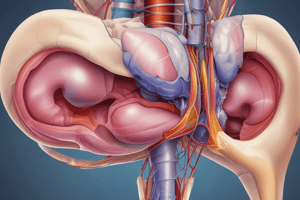Podcast
Questions and Answers
What structures are shown in the diagram of the anterior patellar region?
What structures are shown in the diagram of the anterior patellar region?
Quadriceps, IT tract, lateral collateral ligament, medial collateral ligament, patellar tendon, pes anserinus (semitendinosus, gracilis, and sartorius)
What structures are shown in the diagram of the posterior patellar region?
What structures are shown in the diagram of the posterior patellar region?
Semimembranosus tendon, oblique popliteal ligament, popliteus
What is the largest synovial joint capsule in the body?
What is the largest synovial joint capsule in the body?
At the knee joint
What are the functions of the medial and lateral collateral ligaments?
What are the functions of the medial and lateral collateral ligaments?
What can happen if the IT tract gets really tight?
What can happen if the IT tract gets really tight?
What joints are referenced when discussing OA in relation to the patella?
What joints are referenced when discussing OA in relation to the patella?
What does pes anserinus mean?
What does pes anserinus mean?
What are the three tendons of the pes anserinus?
What are the three tendons of the pes anserinus?
What role does the popliteus play in knee joint function?
What role does the popliteus play in knee joint function?
The stability of the knee joint depends solely on the ligaments connecting the femur and tibia.
The stability of the knee joint depends solely on the ligaments connecting the femur and tibia.
Flashcards are hidden until you start studying
Study Notes
Anterior Patellar Region
- Diagram includes quadriceps, IT tract, lateral collateral ligament, medial collateral ligament, patellar tendon, and pes anserinus (semimembranosus, gracilis, and sartorius).
Posterior Patellar Region
- Diagram features semimembranosus tendon, oblique popliteal ligament, and popliteus muscle.
Knee Joint Capsule
- Largest synovial joint capsule in the body located at the knee joint.
Collateral Ligaments
- Medial and lateral collateral ligaments prevent varus and valgus strain, maintaining knee joint stability in the frontal plane.
Iliotibial (IT) Tract
- Tight IT band can exert lateral tension on the patella, leading to knee pain.
- IT band is not a muscle and is difficult to stretch; runners often roll out their quads to alleviate tightness.
Tibial-Femoral and Patellofemoral Joints
- Osteoarthritis (OA) mainly affects the tibial-femoral joint; problems arise if the patella doesn't glide smoothly over the femur.
- Patella is embedded within the quadriceps tendon, with the patellar tendon functioning as a ligament due to its bone-to-bone connection.
- Patella increases the mechanical advantage of the quadriceps.
Pes Anserinus
- Location where semitendinosus, gracilis, and sartorius tendons insert; known as "goose foot."
- Contains a major bursa that separates bone from tendons; inflammation can cause tightness on the medial side of the knee.
Knee Joint Mechanics
- Knee primarily allows flexion and extension, but also permits some rotation.
- Medial and lateral hamstrings facilitate this rotation; popliteus muscle laterally rotates the femur on the tibia to unlock the knee for flexion.
Knee Joint Stability
- Depends on strength and action of surrounding muscles, especially the quadriceps’ medial and lateral parts.
- Stability also relies on ligaments connecting the femur and tibia.
Studying That Suits You
Use AI to generate personalized quizzes and flashcards to suit your learning preferences.




